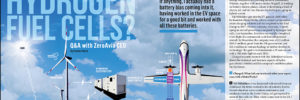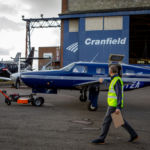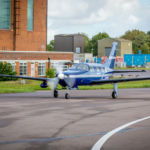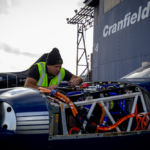Q&A with ZeroAvia CEO
Passenger cars are well on their way to going electric, and the path to a big market share for heavy-duty EVs such as buses and delivery trucks is becoming clearer. However, aviation remains a new frontier for zero emissions. There are several new powertrain options, and none has yet proven itself in regular commercial service. Several startup companies are pursuing different possibilities. Eviation, together with motor-maker MagniX, is working on battery-electric planes, Lilium is developing a kind of electric jet, and the late Zunum was betting on a plug-in hybrid system.
Val Miftakhov got into the EV game in 2010 when he founded eMotorWerks, which created an innovative smart charging solution and was acquired by the Enel Group in 2017. His new company, ZeroAvia, is developing an aircraft powertrain energized by hydrogen fuel cells. Last September, ZeroAvia successfully completed a test flight of a commercial-scale fuel cell-powered aircraft. In December, the company won a £12-million ($16.3-million) grant from the UK government, and $21.4 million in venture funding, to further develop its technology. The goal is to demonstrate a 19-seat aircraft with a 350-mile flight in early 2023.
Charged recently chatted with Mr. Miftakhov to learn about the technical and business aspects of hydrogen-electric aviation and his company’s ambitious plans for the future.
Charged: What led you to aircraft after your experience with eMotorWerks?
Val Miftakhov:I was fascinated with aircraft from my childhood. My father worked in the oil industry, but his formal education was in aviation maintenance and mechanics back in the Soviet Union, so I got exposed to some of that early on. Then, when I came over to the US, I got my pilot’s license.
It was always a personal passion, and I was already working on green transportation, so that was a natural intersection. Right around that time, it started to be apparent that ground mobility was well on the way to cleaning up, and the power sector was already moving in that direction. The next big challenge in transportation is going to be aviation, because that’s the ultimate challenge in terms of the utilization and intensity of energy use, and there is no solution, really. The most people were talking about was carbon offsets of various types, and there were some early talks about sustainable aviation fuels, biofuels, and all that, which are either not scalable or are super-expensive, so I felt that there is a lot of technological opportunity there. That’s when we started.
Charged: You’ve done some pilot programs with battery-electric planes, but your long-term idea is to build fuel cell aircraft, correct?
Val Miftakhov: When we did the initial demonstration flights, the very first one was with batteries, and then the other demonstrations that we did were all fuel cell-based. The idea from day one was hydrogen fuel cell-based drivetrains, but it’s hydrogen-electric, so you have to build the electric part. You have to build the battery powertrain first, and add the fuel cell system. So, that was a progression that we made.
Now we have a test flight program through two flight prototypes in two countries, the US and the UK, which is actually quite significant because the regulatory environments are very different, so we had to go through both countries’ regulatory environments to get things done. The UK is much more stringent compared to the US in getting experimental R&D aircraft up in the air, so that was a great experience, and a good hurdle to cross.
We’ve got a lot of support from the UK government. They funded us for the next size powertrain developments, which will go on now to 10-to-20-seat aircraft, and that’s our first commercial target. There are about 10,000 of these flying around worldwide—commuter service, island-hopping, sub-regional service. It’s already a multi-billion-dollar market, but that’s just the starting point for what we’re doing.
Shortly after that, we plan to go to aircraft of about 50 to 80 seats. And that’s kind of a mainstay of regional aviation aircraft of this size. It’s a mix right now between the turboprops and regional jets like Embraers, and that’s the second segment that we’re targeting.
Charged: Why do you think fuel cells are the best strategy? Can you compare and contrast the three technologies—batteries, fuel cells, jet fuel?
If anything, I actually had a battery bias coming into it, having worked in the EV space for a good bit and worked with all these batteries.
Val Miftakhov: As you can imagine, we did a lot of this [comparison] early on as well. I have a physics background, I’m sort of a first-principles type guy, and the rest of the top technical team is like that too. If anything, I actually had a battery bias coming into it, having worked in the e-space for a good bit and worked with all these batteries.
But we did the overall review—you have jet fuel, you have hydrogen-based solutions, you have battery-based solutions, you have various hybrid solutions. Well, let’s look at them from first principles and see, with the energy demands and the utilization of the vehicle that you have in aviation, what makes sense.
The short summary is that hydrogen as an energy storage medium is about three times better in terms of specific energy, kilowatt-hours per kilogram, than jet fuel, and battery is 50 times worse. When it comes to utilizing that energy, fuel cells are 50-60% efficiency. Jet fuel in a small turbine is about 25% efficiency.
So, with hydrogen you have a significant advantage over jet fuel, and with batteries you have a 50x hit right away. Yes, you have maybe higher efficiency, maybe even 80-85%. But that 50x drop is just not getting you where you want to be.
For small aircraft, like a trainer for example, what [George Bye] is doing with [Colorado e-aircraft manufacturer] Bye Aerospace, makes a lot sense. For training missions, you get up in the air for an hour, and going fast is not your objective—your objective is to work the procedures and airspace and radio calls and all that kind of stuff, so your energy demand is relatively low, power demands are low, endurance demands are low.
In those environments, batteries work pretty well. Also, probably for private aircraft, which don’t have a lot of utilization, batteries might work as well, subject to range limitations. But for a commercial use case, for a regional scheduled service use case, for instance, which is what we are targeting, you will get six, eight cycles on your pack per day. If you’re going to go to, let’s say, San Francisco-Los Angeles round trip, you’re going to make three or four round trips per day, and every trip is going to be substantially depleting your battery to the maximum capacity. If you can even squeeze that much energy into the battery in the first place. Because we’re talking about 10-to-20-seat aircraft as a minimum, and you need to have passenger and cargo capacity.
So, you’re going to have eight cycles a day, and a typical high-energy-density battery that is in production, something like Tesla, has let’s say [a life expectancy of] 1,000, 2,000 cycles. Pick your number, but 2,000 cycles over eight cycles a day, that’s about seven or eight months [of battery life]. So, then what are you going to do? And by the way, in order to pack that much battery into the aircraft, you will have to make it pretty much a structural element of your airframe, because you run out of space and weight allowance. And if you need to replace it every eight months, then it becomes problematic.
Then we looked at hybrids, and really, it’s very incremental, you maybe get 15-20% improvement [versus jet fuel], not more. Is it worth it to go through all that trouble to get that?
With biofuels, if you look at the relative efficiency of converting solar energy into biofuel versus solar energy into hydrogen, it’s not even a comparison, it’s ridiculous, it’s 500 times difference. Biological organisms are not great at converting sunlight into energy.
The only remaining things that make sense are what people call electrofuels. You can use hydrogen and CO2 capture to create liquid fuel and then burn it. That has its own problems. If you look at the climate impact of aviation, less than half of that is CO2, the rest of it is stuff like nitrogen oxide. Then you have particle emissions from combustion [which] become condensation centers and create cloud formations, and that traps heat. All of those things, they actually contribute more [air pollution] than CO2 alone. And if you go with electrofuels even with zero CO2 emissions, you’re solving less than half of the problem.
It’s pretty clear that hydrogen-electric is the answer. For two years, we were pretty much the only ones saying that.
So, all of that combined, it’s pretty clear that hydrogen-electric is the answer. For two years, we were pretty much the only ones saying that, and then last year, Airbus was the first major that said, “Hydrogen is the answer, and that’s what we’re going to focus on.” And they explicitly said that hybrids are not the answer, and that batteries are not the answer.
So, that was good and validating, and of course, they are going after the larger airplanes. I don’t know how active their projects are right now, but they’ve announced that that’s what they’re going to focus on, and they’ve unveiled three brand-new aircraft designs that they’re going to be working on that are dedicated to hydrogen.
Charged: What are your projections for cost per mile? Is it on par with jet fuel?
Val Miftakhov:It depends on which timeframe you take, and which aircraft type, because it’s a complex optimization matrix. Small aircraft, for example, are less efficient, so for them hydrogen-electric is better, relatively speaking, than for the largest aircraft.
A small turbine has 25% thermodynamic efficiency, and the largest turbines, like [the ones in a Boeing 777] are 50% efficient. So, for small aircraft, three years out, when we’re going to have [fuel cell planes] in commercial operation, we’re going to have about 20 to 30% lower cost than jet fuel, assuming jet fuel costs at pre-pandemic levels, before any kind of incentives.
In California, there is a Low Carbon Fuel Standard program. I benefited from it quite a bit in my previous company [eMotorWerks], charging cars and getting credits, and it was great. And they’ve just extended it to aviation. So, I can go to the operators and say, “If we can show that our hydrogen comes from zero-emission sources, we can get the credit, pretty much offsetting the entire fuel costs in California today.”
The 20 to 30% savings is before that is taken into account. If you take into account whatever [incentives] exist already like this, and whatever comes out of the new [US presidential administration,] it gets even better, hopefully.
Charged: Let’s talk about the engineering challenges you’re currently focusing on. Where are you exactly in terms of fuel cell development for aircraft?
Val Miftakhov:We’re working a lot on what’s called the fuel cell balance of plant. How do you supply the fuel cell stacks with the right inputs? You have an oxygen supply system or air supply system, you have hydrogen supply, you have humidification, you have pressure and temperature parameters that you need to hold, to extract heat out of the system. All of that is actually where the bottlenecks are today in the system design.
Pretty much nothing that was designed for automotive really works, so in order to make competitive products you have to redo all that.
Aviation is a very different use case compared to automotive in terms of how power is used, what kind of cooling capabilities you have, and what kind of environments you’re operating in. Pretty much nothing that was designed for automotive really works, so in order to make competitive products you have to redo all that. And you have to redo all that anyway, in order to be certifiable, so you might as well do it better. So, that’s a lot of what we do.
And then of course, you also need to run the entire system as a whole with all the power management and integration with the rest of the aircraft. So, we build our own flight computers, software integration with the airframe, and our own avionics system around the engine.
Charged: In a recent interview with Aviation Week, you mentioned that getting rid of heat during takeoff in hot climates is proving to be a hard problem. Can you explain more about the problem, and how you plan to solve it?
Val Miftakhov: One of the biggest technical challenges in this 20-seat-size airframe is thermal management. You have waste heat, much less of it than a turbine because of higher efficiency, but still you need to get rid of it. The challenge is that it’s at a low delta T [the temperature difference between a heat source and the surrounding air] so it’s harder.
If you have a fuel cell that operates at about 80-90°C, and you’re in a place like Phoenix, Arizona, on takeoff at 40-50° C air temperature, you need to dump a lot of heat with only a delta T of 40° C.
If you have a fuel cell that operates at about 80-90° C, and you’re in a place like Phoenix, Arizona, on takeoff at 40-50° C air temperature, you need to dump a lot of heat with only a delta T of 40° C. Once you’re at cruise it’s relatively easy, because the air is colder and you’re not at full power, but takeoff at sea level in the desert is challenging.
We have a few solutions. One is, that part of the flight where you really have a severe problem is relatively short. So, you can deal with some part of that through increasing thermal inertia of the system artificially. Then, since that time is so short, you also can manage the fuel cell system outside of its ideal parameters. It may be at a high-degradation portion of its operating zone, but because it’s so short, it does not significantly affect the average lifetime of the system.
That’s relatively common in aircraft in general, especially in helicopters. A lot of the larger helicopters have a 30-second maximum power rating on the engines, and they have computers that take the intensity of operation and then multiply the time you spent in those regions by certain factors, and then that is used to calculate the effective lifetime. Also, in aviation you replace things when they hit a certain number of hours. So, you may have this 30-second limit operation, every minute spent there costs you an effective hour, and it adds up. So, you can do things like that—for example, you’re going to operate the cell stack at a higher temperature for 30 seconds. And you could get away with this, that increases the delta T, that actually makes the operation a little bit better from other perspectives as well. But it costs you some lifetime.
You can make those trade-offs because a typical take-off lasts 30 seconds to a minute, and then you drop your throttle back to, say, 85% of the maximum power and that’s your climb-out, and then in cruise you’re at 40-50%, and you just do it for an hour.
Charged: Is there battery storage in the system at all, or do you operate directly from the fuel cell to the e-machine?
Val Miftakhov: We go pretty much directly from the fuel cell. Now, in the prototype vehicles we do have the battery storage as a failover system. So, in case we have any issues with one source of power, we have an ability to automatically switch over to the second one.
Charged: What about your motors and your power electronics modules? Are those systems similar to things used in other applications, or are you developing specific motors and power electronics for this application?
Val Miftakhov: Conceptually similar, but we’re using our own power electronics. Pretty much everything that goes into the complete power plant we can’t take off the shelf. That’s not going to be certifiable—you will not be able to push it through and fly people, or even cargo, or any commercial operation with it. So, you basically have to redesign things, generally speaking.
Charged: You can’t even use automotive-quality stuff, the high end?
Val Miftakhov: No. Now, some of that redesign we push to our partners, and we manage it. As part of the company, we have what’s called design organization—aviation-grade, certification-targeted management of processes, how you do design, how you capture requirements, how you flow the requirements through the design process. For example, we need controllability for materials—I need to know where that aluminum that went into that motor came from, which batch. And if I have a problem later on with engine number 1,000 or whatever, I can trace it back to the source, and with the authorities, we can analyze where the problem is, so that we can fix it.
That’s why commercial aviation is so safe, because all of that stuff is there. But that means that I can’t buy from just any supplier. Even if they know where the materials are coming from, they need to have the system tracing that is qualified for aviation. There has to be a level of control, a signatory authority, and a lot of stuff. So, in the end basically, we control the redesign of everything. A lot of that we do in-house, a few things we partner up with various folks on.
But there’s no fundamental new topologies on the motor side, and by now a lot of folks are using silicon carbide power inverters and all that. We do some interesting things on that, switching management to improve the efficiency there, but it’s not really rocket science.
Charged: What about your business plan? You hope to become the powertrain provider and the infrastructure provider for these systems?
For scheduled service, when you have a predictable “point A to point B” schedule, the infrastructure question becomes pretty trivial.
Val Miftakhov: Our primary customers are the airlines and cargo operators. For scheduled service, when you have a predictable “point A to point B” schedule, the infrastructure question becomes pretty trivial. And that’s why, by the way, aviation is a much better use case for hydrogen than ground mobility, especially personal vehicles. Personal vehicles are the worst possible transportation use case for hydrogen. Unfortunately, that’s where it started, or people try to push it. I think it should have been started in aviation.
So, our main customer is airlines, and then we together work with the aircraft manufacturers to make sure that our engines are adapted to the aircraft. We need support from the aircraft manufacturers, but we work with them, we don’t design our own aircraft, because I don’t want to compete with everybody, I want to partner with these folks.
And then we sell our power plants, our engines, to the operators on what’s called a power-by-the-hour model, which is actually relatively common in the industry. The operator would pay on an hourly basis for the operation of the engine, effectively leasing the engine on an hourly basis. Our tweak to that is that we add the fuel price into it. And there are two reasons for that. One is that hydrogen is not a commodity, it doesn’t exist at the airport, so we feel that in order to have any kind of market penetration, we have to lead that side of the equation.
And the second reason is that [the fuel] is actually where a lot of the money is in aviation. If you look at the overall markets, worldwide aviation is about one and a half trillion dollars today, out of which 100 billion is engine, 200 billion is aircraft, 200 billion is fuel, and the rest is operations. Fuel is as big as the aircraft-making market, and probably more profitable.
So, as part of our initial demonstrations in the UK last year, we built out the hydrogen production facility, making our own fuel from electrolysis [using] renewable energy. We have a refueling truck on the field at Cranfield in the UK that refuels our plane, so we have a very small version of how we see the blueprint of aviation of the future.
Charged: What do you see as the future of the hydrogen infrastructure? Localized production?
Val Miftakhov: Yeah. Look at the concentration levels. In the US, you have 50 airports that concentrate 85% of all traffic by passenger counts, 150 airports [account for] 97%, and 500 airports is the whole thing. Aviation uses a lot of fuel, and that fuel use is concentrated in these 500 locations, so every location is a huge location relative to what you’re used to [with ground transportation]—even truck depots are no comparison. So, that creates an opportunity for decentralized production, because you’re clear into the positive economics at pretty much every one of those locations.
It makes a lot of sense. Also, hydrogen is a very tricky fuel to transport just because of the volumes. So, until you build pipelines, which is a significant exercise, transportation is almost a prohibitive factor. Distributed production allows you to avoid all that and reduce the price of the commodity at fueling points, which is important for the economics of operation.
Charged: Do you have a separate development project going on currently with production and distribution of hydrogen, or are you just focusing on the powertrain now?
Val Miftakhov: We work with folks who have electrolysis technology. We’re not building that much of a technology on the fueling side, but every program that we launch—the 6-seat program, the 20-seat program—has an infrastructure component. Shell joined us as an investor last December, and of course they know a thing or two—they’re actually the largest aviation fuel supplier, and probably the largest hydrogen manufacturer, worldwide. They’re pretty experienced in green hydrogen production—they have the largest electrolysis-based green hydrogen plant today.
So, every program already has the fueling components. Because without that, they don’t know what to do with these [hydrogen aircraft]. And part of this is the fuel standards. Again, you’re going to put it in the aircraft, so it has to be approved, there is aviation-grade hydrogen fuel. From a practical standpoint, it could be the same grade fuel as in automotive, but the way you control it, the way you measure it, the way you build these safety systems around it, is going to be completely different. You have to kind of push into that as well, and there’s protected space that you’re building by being the first, and that’s what we intend to do.
Charged: In the aircraft industry there’s an enormous body of safety regulations. Is that going to be an issue for you? Are you actively involved in discussions with the regulatory bodies to talk about service life, redundancy concerns? Are there standards that carry over from jet fuel engines, or are these new things that are going to have to be redefined?
Val Miftakhov: Some things carry over, but a lot of stuff needs to be defined. We’ve been working with the regulators since inception, especially for the last two years. The regulator in the UK is actually formally a part of the project that we just kicked off for the first commercial entry system. We’re going to fly the 20-seaters this year. From the technology standpoint, the timeline for commercial introduction is all about the certification timeline. That’s why it’s three years out, and not this year or next year. Because we can actually build the thing and have it flying in the next 12 months.
Charged: Can you give us a general idea of what the range would be for a 20-seater in five years?
Val Miftakhov: For a 20-seater at the point of introduction—three years out or so—about 500 miles. Maximum range for those things, if you fill it up with fuel to the top, would be about 1,000 miles. But at least 95% of all missions for that aircraft are sub-500 miles. They tend to be used on regional rounds like the San Francisco-Los Angeles example I mentioned. And they’re relatively slow aircraft, so you’re not going 1,000 miles in those. There are some missions like that, like surveillance, government reconnaissance and all that, but we’re not targeting those, we’re targeting these one-hour hops.
And for those, 500 miles is more than sufficient, and with hydrogen, you have refueling times that are comparable with jet fuel. So, from the operation standpoint, like turnaround times and schedules, there’s relatively little impact.
Charged: What is your opinion of these vertical-takeoff sort of flying Ubers that people are talking about? Do you see any feasibility in those?
Val Miftakhov: Technical feasibility, sure. Market feasibility is a big question, especially for human transportation in dense environments. That will take a lot of time, from many perspectives. Now, we are already seeing some applications of that at a small scale for unmanned cargo transport in non-dense environments. UPS is running drone delivery operations, Google is running some operations. That’s where I think most of the action will be for a while. But San Francisco to San Jose in an autonomous drone, I don’t know…
Assuming you handle [the technology challenges], you’re going to have other things that are problematic. When you start doing the math, for example, on what kind of aircraft per cubic kilometer of air density you will have in order to have any kind of market, just do that with two- or three-seater aircraft, and see what kind of density you have and then ask, what kind of air traffic control would not break under those assumptions, especially if everybody wants to land in San Francisco?
And where people want to go is to population centers, so it becomes very difficult. But not impossible. It will happen at some point. I think a lot of people have an overly optimistic timeline, and it’s not about technology necessarily.
I think the real driver for our fuel cell systems is going to be operating cost advantages.
Charged: What do you think are going to be the initial and long-term drivers of adoption for your systems? Do you think it’s going to be performance, cost, regulations, or a mixture of the three?
Val Miftakhov: I think the real driver for our fuel cell systems is going to be operating cost advantages. The maintenance cost is going to be dramatically lower, because you don’t have extreme high-temperature, high-pressure operation that drives material stress. It may be not as maintenance-free as a battery aircraft would be, but it’s going to be much better than a standard fossil fuel engine. The fuel cost we talked about—you’re going to have lower costs of operation, which is very significant for the airlines, so that’s going to be a primary factor.
Initially, perhaps the regulatory side will be quite important, and we’ll see what happens there. But the way we build these solutions and look at the economics of them, they do not require subsidies. That’s the whole idea, because without that approach you’re building a very risky business that depends on the government—if the government decides to do something different, then you’re screwed.
This article appeared in Charged Issue 53 – January/February 2021 – Subscribe now.
Source: Electric Vehicles Magazine








